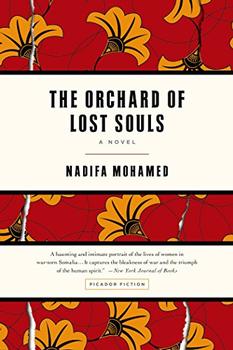Summary | Excerpt | Reviews | Beyond the Book | Readalikes | Genres & Themes | Author Bio

Critics' Opinion:
Readers' Opinion:
First Published:
Mar 2014, 352 pages
Paperback:
Jun 2015, 352 pages
 Book Reviewed by:
Book Reviewed by:
Lucy Rock
Buy This Book
The vehicle is soon full of clamouring schoolchildren pressing against her on all sides. A girl sits next to her, crying open-mouthed, choking on her sobs. Deqo can feel the girl's bones and flesh grinding against her own as the truck's engine starts and they roar across the uneven road. Even in this teeming truck the girl smells fresh, her skin and uniform so scrubbed with soap that her perspiration has the heady, detergent scent that wafts out of the dhobi-houses.
'Don't cry,' says Deqo, placing a hand on the girl's arm.
'Don't touch me!' she shouts, pushing Deqo away.
An older pink-shirted girl throws her arm proprietorially over the crying girl's shoulders and kisses her head. 'Shush, shush, Waris, I'm with you.'
Deqo turns her head away and purses her lips. I don't owe you anything, she thinks. In fact I should be angry with you for causing trouble, stupid girl. She doesn't understand why the schoolchildren and soldiers keep fighting. They all have food, all have homes and parents, what is there to squabble over? They should go to the refugee camp and see what life is like there. She covers her feet with her hands, ashamed by her dusty, long-nailed toes, the calloused, scaly skin, her red cotton smock fraying at every hem. Pulling her knees together she draws away from the boys sitting nearby. They do not hold their bodies as far away from her as they do the schoolgirls, she notices; there is barely an inch between her and any of the boys' limbs. They always nudge her in the street too, making her feel small and grubby. There isn't any dhobi-smell about them, only musk as sharp as vinegar that rubs onto her skin as they fall against her with the truck's tortuous drive.
The truck dips into one last pothole and then stops, the engine still trembling under the hood. To her right is the central police station, the first place she saw in Hargeisa after the stadium. A red beret pulls down the lip of the truck bed and ushers out the children. Ordinary policemen in white shirts lead them to the station, holding two in each hand by their shirt collars.
Finally it is Deqo's turn and she recoils as the red beret reaches for her; he is like a figure in a bad dream, silent, cruel and persistent. She squeals in pain as his vicelike hands grasp her ankle, another hand moves to her thigh and he yanks her out. Her body is not her own, she thinks; it is a shell they are trying to break open. A policeman with his trousers belted over his fat gut and his flies half done up swears at the prisoners, slapping the back of Deqo's legs with a flat, hard palm and wrangling her arms behind her back. Holding her wrists and those of the fragrant girl's in one hand he marches them through the haze of dust that the struggling protestors have kicked up and ascends the tall, rain-stained concrete steps into the police station.
In the dingy, dark corridor a young guard sits on a metal chair to the right. He looks at the passing schoolchildren with big, melancholic eyes. 'Help me,' she mouths as she skids over the green-tiled floor, but he doesn't shift, just cradles his gun with long, large-knuckled fingers, veins twisting under his smooth skin. Deqo feels as if she is treading water, pulled into a current she can't escape.
The schoolchildren are led through to the cells, the girls put into one communal cell and the boys pushed deeper into the station. Deqo's wrists burn where the big-bellied policeman has been squeezing them and she shakes them in the air to cool. A few steps into the cell she is overcome by the stench of excrement. Older prisoners have to sit up and move to make room for the protestors and complain loudly at the intrusion. Four young women with their hair in thick plaits huddle together along the back wall. One of the large women kicks at them and shouts, 'Roohi, move it'; they obey and she spreads out her rush mat in the small space they had shared.
Copyright © 2013 by Nadifa Mohamed





The House on Biscayne Bay
by Chanel Cleeton
As death stalks a gothic mansion in Miami, the lives of two women intertwine as the past and present collide.

The Flower Sisters
by Michelle Collins Anderson
From the new Fannie Flagg of the Ozarks, a richly-woven story of family, forgiveness, and reinvention.

The Funeral Cryer by Wenyan Lu
Debut novelist Wenyan Lu brings us this witty yet profound story about one woman's midlife reawakening in contemporary rural China.
Your guide toexceptional books
BookBrowse seeks out and recommends the best in contemporary fiction and nonfiction—books that not only engage and entertain but also deepen our understanding of ourselves and the world around us.